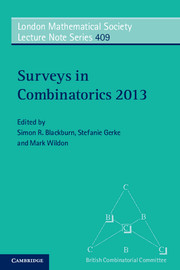Book contents
- Frontmatter
- Contents
- Preface
- 1 Graph removal lemmas
- 2 The geometry of covering codes: small complete caps and saturating sets in Galois spaces
- 3 Bent functions and their connections to combinatorics
- 4 The complexity of change
- 5 How symmetric can maps on surfaces be?
- 6 Some open problems on permutation patterns
- 7 The world of hereditary graph classes viewed through Truemper configurations
- 8 Structure in minor-closed classes of matroids
- 9 Automatic counting of tilings of skinny plane regions
- References
1 - Graph removal lemmas
Published online by Cambridge University Press: 05 July 2013
- Frontmatter
- Contents
- Preface
- 1 Graph removal lemmas
- 2 The geometry of covering codes: small complete caps and saturating sets in Galois spaces
- 3 Bent functions and their connections to combinatorics
- 4 The complexity of change
- 5 How symmetric can maps on surfaces be?
- 6 Some open problems on permutation patterns
- 7 The world of hereditary graph classes viewed through Truemper configurations
- 8 Structure in minor-closed classes of matroids
- 9 Automatic counting of tilings of skinny plane regions
- References
Summary
Abstract
The graph removal lemma states that any graph on n vertices with o(nh) copies of a fixed graph H on h vertices may be made H-free by removing o(n2) edges. Despite its innocent appearance, this lemma and its extensions have several important consequences in number theory, discrete geometry, graph theory and computer science. In this survey we discuss these lemmas, focusing in particular on recent improvements to their quantitative aspects.
Introduction
The triangle removal lemma states that for every ε > 0 there exists δ > 0 such that any graph on n vertices with at most δn3 triangles may be made triangle-free by removing at most εn2 edges. This result, proved by Ruzsa and Szemerédi [94] in 1976, was originally stated in rather different language.
The original formulation was in terms of the (6, 3)-problem. This asks for the maximum number of edges f(3)(n, 6, 3) in a 3-uniform hypergraph on n vertices such that no 6 vertices contain 3 edges. Answering a question of Brown, Erdὄs and Sós [19], Ruzsa and Szemerédi showed that f(3)(n, 6, 3) = o(n2). Their proof used several iterations of an early version of Szemerédi's regularity lemma [111].
This result, developed by Szemerédi in his proof of the Erdὄos-Turán conjecture on arithmetic progressions in dense sets [110], states that every graph may be partitioned into a small number of vertex sets so that the graph between almost every pair of vertex sets is random-like.
Information
- Type
- Chapter
- Information
- Surveys in Combinatorics 2013 , pp. 1 - 50Publisher: Cambridge University PressPrint publication year: 2013
References
Accessibility standard: Unknown
Why this information is here
This section outlines the accessibility features of this content - including support for screen readers, full keyboard navigation and high-contrast display options. This may not be relevant for you.Accessibility Information
- 20
- Cited by
